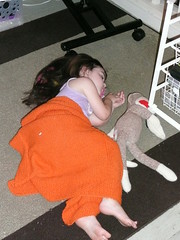
Our three and a half year old niece was visiting last weekend with Michele's mom. Nothing like spending 24-7 with a little kid to curb the "breeder" urge. I love Abby- she is completely adorable (Above: she curled up and fell asleep on the landing of the second floor so she could hear us talking downstairs) and tons of fun. Abby is smart and she has a fantastic laugh. Michele's brother and sister-in-law now have 3 kids- Abby, a one year old, and an infant! In less than 5 years! These people are crazy. Either that or they just hope to re-populate the Earth with libertarian, slow-package-openning engineers. And regardless, 3 is too many. Unless you are planning on cloning yourself or your spouse, man-on-man coverage is no longer an option. And in my eyes, kids have the number on every zone defense in the book. And I don't know about you, but I can't play zone. Thus the need to have a maximum of 2 kids at all times.
I like kids, don't get me wrong. I don't have kid-fear like some people I know (ahem, Michele). But being someone never to enter into a situation lightly, I take the prospect of having kids pretty seriously. Maybe it's because for me there will be no "happy accidents." It's not a bad deal, actually, since I'm already a planner by nature. Not to restate the obvious, but a kid is a lot of work. And honestly, I don't really mind playing the selfish card and being up front about the fact that I don't see myself having time for a kid anywhere in the near future. I kinda like this aunt gig, where I can hang out with them for a while and then give them back. It's responsibility-lite. After the last week I'm putting a five year hiatus on any possiblity of having kids. There is too much going on in my life to even think about it. And I know that right now I'd much rather spend my free time with Michele, with friends, with books and food and beer and wine. And I'm okay with that. We can have the intelligent, progressive people-need-to-have-more-babies conversation later.




